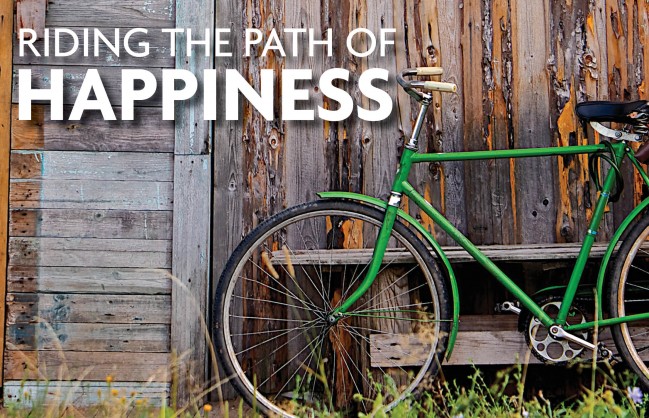 By Paul Prosser and Scott Cloutier
By Paul Prosser and Scott Cloutier
The pursuit of happiness can be thought of as a bicycle ride through life. Traffic, wind and rain, much like daily life challenges, distract us from the beauty of our surroundings and the way our body moves in harmony with the machine. On a bike or in life, an adult can experience the world through the eyes of a child – everything is new and unique. Subconsciously, we are in tune with both our internal and external environments – a connection both physical and spiritual in nature. Children, on the other hand, are constantly exploring their environment to make connections. Because everything is so new and fresh, those explorations are on a more immediate and conscious plane. Adults need to work more deliberately to be mindful of the body-mind and physical-spiritual connections with nature. Connections of mind and body are not limited to cycling – gardening, cooking, yoga, sports, martial arts, running or countless other healthful pursuits boost mindfulness and well-being.
Consider the wheel of a bike, the essential part that carries us down our path, built with hub and spokes supporting rim and tire. As the hub is the structural center of the wheel, happiness is the structural center of life. The rim and tire represent our contact with the natural world, spokes are energy pathways maintaining connection to wellness. Some spokes include eating habits, family relationships and social connections. If the rim and spokes are compromised in some way, our happiness opportunities are reduced. If the happiness wheel loses shape, as a result of a damaged spoke, the bike becomes wobbly – happiness is diminished. If the damage is severe enough, riding becomes impossible – happiness is unattainable. To maintain happiness we need to be mindful of every spoke’s condition.
Mainstream American culture tends to reinforce our dominion over nature, while other cultures embrace an integrated lifestyle. For instance, the Navajo believe that our world is entirely connected; maintaining “right” relationships with the rocks, sun and stars is as important as tending to human relationships. Humans are in constant communication with water, air and earth; indigenous beliefs reinforce spiritual and physical realms as inseparable.
In America, the focus tends to be on working hard, making money, living in a comfortable house, and filling it with material things. Yet, the old trope remains true: money can’t buy happiness. There are upper limits to the impact of income on happiness, and research indicates happiness plateaus around $75,000 in the U.S. It’s not that material things are inherently bad, but possessions without spiritual or emotional value are devoid of the connections we need to increase our happiness. If you ask people what possession they would save if their house were burning down, most talk about family photos or heirlooms.
During our time working in neighborhoods in developing countries, where material possessions are limited and income is low, people consistently express high levels of overall happiness. In our conversations with residents, we’ve been told happiness is the result of deep family and community ties, spiritual and physical connections with nature, and the narrow gap between aspirations and their reality. The focus is on quality of life, not quantity of possessions. Though challenges to personal freedom exist, coupled with fewer work opportunities, lower incomes and multiple health challenges, people are grateful for the opportunities for happiness available to them. Gratefulness is a practiced art form, and happiness levels hold steady against a tide of inequity.
Some questions to ask when we are considering what actions might increase happiness are: Does it have emotional and spiritual value? Will it improve overall health and well-being? Does it add long term value? Will it help balance my life? If you can answer in the affirmative to all of these questions, then happiness is likely to result.
Paul J. Prosser is a local architect and a Master of Sustainable Solutions student in Arizona State University’s Julie Ann Wrigley Global Institute of Sustainability. His work at ASU focuses on using local knowledge to increase happiness opportunities in the built environment.
Scott Cloutier is a Walton Sustainability Fellow and Assistant Research Professor within the Global Institute of Sustainability at Arizona State University. His works focuses on community development that might maximize opportunities for happiness through locally developed sustainable solutions.
Find more health & wellness articles at greenlivingaz.com/health






